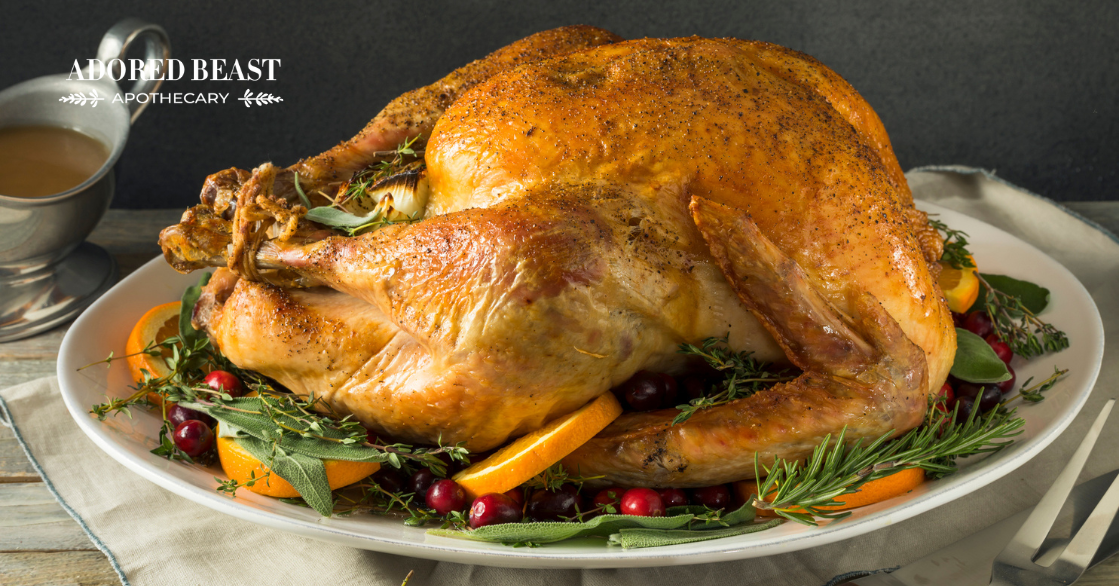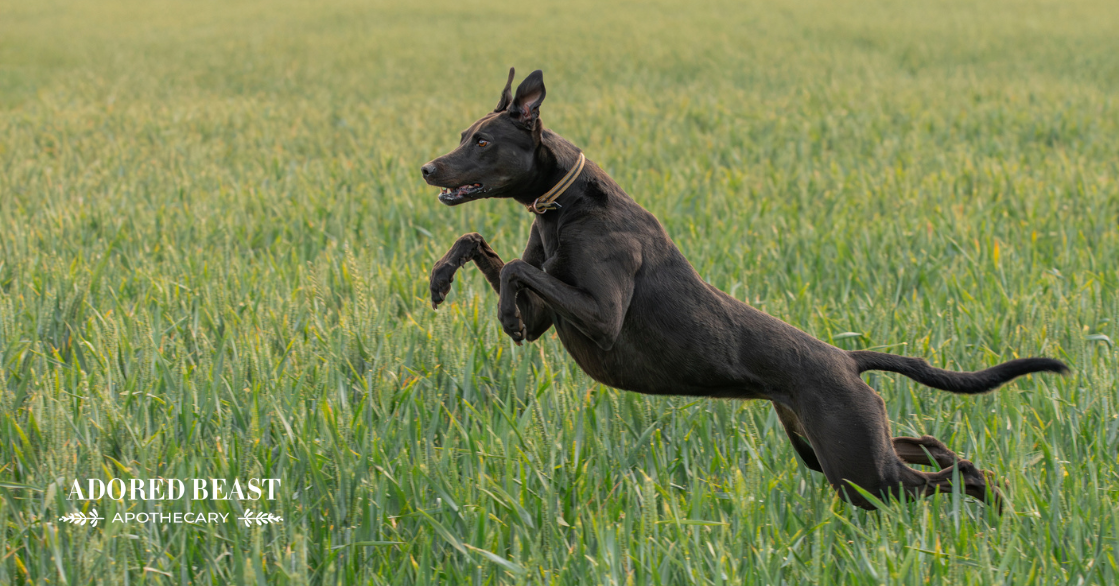When you think of Thanksgiving dinner, or the holidays in general, what’s the first thing you think of? I bet it’s turkey.
Turkey isn’t just the star of the holiday table anymore – it’s also becoming a go-to protein for many pet parents seeking fresh, wholesome options for their dogs. But the big question is: Can dogs eat turkey?
The short answer is yes, dogs can eat turkey – and often thrive on it – as long as it’s prepared properly.
Below, we break down the benefits, what to avoid, how to feed it safely, and why turkey is considered a calming food in both modern nutrition and canine energetics.
Is Turkey Good for Dogs?
Absolutely! Turkey is a lean, highly digestible protein that can be an excellent addition to many dogs’ diets. It’s particularly helpful for:
- Dogs with sensitive stomachs
- Dogs requiring a leaner protein source
- Dogs on rotational or biologically appropriate diets
- Dogs needing calming, grounding meals (more on that below!)
Turkey is celebrated for its impressive nutrient density:
- High-quality protein – Supports muscle maintenance and repair
- Tryptophan – An amino acid known for its calming effects
- B vitamins (B6 & B12) – Vital for energy, cognition, and nervous system health
- Niacin – Supports metabolism and skin health
- Zinc & Selenium – Important for immune balance and antioxidant protection
- Low in fat (especially turkey breast) – Great for weight management or dogs prone to pancreatitis (in moderation)
This combination makes turkey a nutrient-rich choice for dogs of all life stages, but as mentioned, you just need to be mindful of how you prepare it.
Raw vs. Cooked Turkey: What’s Safe?
Raw Turkey (Generally Safe for Most Dogs)
Raw feeding advocates love turkey because it’s a soft, digestible protein that many dogs tolerate well. Raw turkey pieces like breast, thighs, or ground turkey – can be part of a balanced raw diet. It’s a regular for one of our pups, and she loves it (the other is sensitive to it, so we keep it off her plate).
Raw turkey necks are especially popular because:
- They’re great for dental health
- They provide natural glucosamine and chondroitin
- They allow safe chewing without the risk of splintering
- They’re great for mental stimulation
Important: Only feed raw bones. Never cooked.
Cooked Turkey (Safe With Rules)
Dogs can eat cooked turkey, but it needs to be plain and unseasoned. That means:
Good:
- Plain roasted turkey breast
- Boiled or baked turkey
- Leftover unseasoned meat
- Ground turkey cooked without oil, spices, or onions
Avoid:
- Seasonings (especially garlic, onions, butter, heavy salt)
- Turkey skin (it’s too fatty, and can trigger pancreatitis)
- Stuffing or gravy
- Cooked bones of any kind (they splinter easily and can cause choking or perforations)
For holiday leftovers, it’s usually best to set aside a dog-safe portion before the seasoning goes on.
Turkey For Calming?
You know how we all feel tired after a big Thanksgiving meal? It’s not just because we’ve overloaded the plate and filled our bellies to bursting! Turkey’s calming reputation isn’t just a holiday myth, it’s rooted in real nutritional and energetic principles.
1. Tryptophan: The Chill Amino Acid
Turkey contains tryptophan, which the body uses to produce serotonin – a neurotransmitter that supports relaxation, emotional stability, and overall well-being.
Dogs with anxiety, over-arousal, or stress-related behaviors may benefit from turkey as part of their regular rotation.
2. Canine Energetics: Turkey as a “Cooling” and Grounding Protein
In traditional food energetics (used in both Eastern and holistic veterinary medicine), different proteins affect the body in different ways:
- Turkey is a cooling protein, meaning it helps reduce internal heat and inflammation.
- It’s also grounding, helping calm dogs who are easily overstimulated, anxious, or run “hot.”
Turkey is often recommended for:
- Reactive or nervous dogs
- Dogs with skin inflammation
- Dogs who run warm or pant excessively
- Dogs recovering from stress or trauma
By balancing the energetic qualities of the body, turkey can support emotional harmony as well as physical health.
[RELATED] To learn more about canine energetics, read this post from our friend Rita Hogan!
How to Safely Add Turkey to Your Dog’s Diet
There are many easy, healthy ways to incorporate turkey into the rotation.
- If your pup is new to turkey, slowly introduce it with a spoonful of cooked ground turkey over their meal or some shredded unseasoned turkey breast as a topper
- If you feed raw, whether commercial or homemade, but haven’t tried turkey before, try it!
- Raw bones – turkey necks and turkey wings (for more experienced chewers) are a great option. Here’s more on raw bones if you’re new to feeding them.
- Bone broth is perfect! Save that turkey carcass and make your own bone broth – here’s our recipe.
Or, make some fun and healthy treats, like these turkey and blueberry bites:
Ingredients:
- 1 lb ground turkey
- ¼ cup mashed blueberries
To make them, combine the turkey and blueberries and form into bite-sized balls. You can feed these raw or bake them at 325°F until cooked through. They’re good in the fridge for about a week, or freeze them for turkey anytime!
When Should Dogs Not Eat Turkey?
Avoid turkey or use caution if your dog has:
- A known poultry allergy
- Pancreatitis or chronic digestive inflammation (use lean breast meat only, in moderation)
- Trouble chewing bones (choose ground or boneless options instead)
If in doubt, start small or consult your holistic veterinarian.
So, can dogs eat turkey? Yes – and many dogs benefit from it. Turkey is a lean, calming, nutrient-dense protein that supports digestion, immune health, emotional balance, and overall vitality. Whether offered raw or cooked, it’s a safe and healthy option as long as you keep it plain, unseasoned, and bone-smart.
Turkey is more than a holiday treat – it’s a wonderful everyday protein that supports your dog’s whole body, inside and out.












